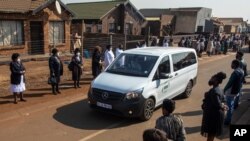Thousands of health care workers across Africa have contracted coronavirus, a fact that worries international health officials who say the continent’s health infrastructure is strained enough without the added threat. In South Africa more than 3,500 health care workers have fallen ill, and at least 34 have died.
Nearly 770,000 people have been known to have contracted COVID-19 in the African region. And, says Dr. Matshidiso Moeti, the World Health Organization’s regional director for Africa, buried in those numbers is a key group that is on the front lines of the battle.
“In the African region, more than 10,000 health workers have been infected with COVID-19," said Moeti. "One of the biggest challenges in protecting health workers has been the global shortage of personal protective equipment, which has severely affected countries on the continent.”
Moeti says more than 2 million items of PPE, including masks, goggles and gloves, have been shipped to African countries so far, with many more in the pipeline.
According to Ghana-based midwife Dr. Jemima A. Dennis-Antwi, the health workers getting sick aren’t always the obvious ones. Of the more than 2,000 infected health workers in the West African country, a significant portion are nurses and midwives.”
“Over 410 nurses and midwives have been affected in Ghana on duty … And this is because, of course, we are needed to save our patients 24/7," said Dennis-Antwi. "The increasing numbers of infectivity among health professionals, coupled with limited or lack of consistent supply of resources as I’ve been stating, results in refusal to attend to patients, psychological stress to self and families, and constant threats of industrial action among many in countries. These, as we all know, have serious implications for quality care, especially reproductive mountain, maternal, newborn, child and adolescent care.”
Experts are calling for more protective equipment, for greater testing for health professionals, and for some common sense suggestions. For example, Dennis-Antwi suggested that health-care facilities should provide meals for on-shift workers, to keep them from leaving the grounds to seek food.
In Sierra Leone, officials are thinking even bigger, says Health Minister Dr. Alpha Wurie. In coming weeks, the nation plans to roll out a health-insurance plan for all health workers.
Most of the continent’s affected health workers are in South Africa, the continent’s viral hotspot. But, Moeti said, epidemiologists are seeing COVID-19 spreading to health workers in Algeria, Kenya, Ghana and Ivory Coast.
She says governments are reacting to the influx of data to avoid harsh measures such as complete lockdowns.
“We've seen some countries, Cote D’Ivoire is an example, really use the data to adjust the response, if you like, lockdown locally where it's necessary to enable life to continue and the economy to open up in other localities," she said. "I think that one of the most important things to do is to really enable people to grapple with the challenging circumstances and play their role in limiting the spread.”
That, she said, is the best strategy: Wear a mask. Wash your hands thoroughly, and often. And keep your distance.






